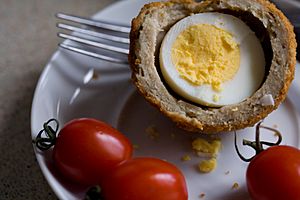Scotch egg facts for kids

Scotch egg, cut in half
|
|
| Type | Picnic food |
|---|---|
| Place of origin | England |
| Main ingredients | Boiled egg, sausage, bread crumbs |
A Scotch egg is a boiled egg wrapped in sausage meat. It is then covered in breadcrumbs and either baked or deep-fried.
Contents
The History of Scotch Eggs
The first time the name "Scotch egg" appeared was in 1809. It was in a cookbook by Maria Rundell called A New System of Domestic Cookery. The recipe itself was in the book's first edition from 1805. Back then, Scotch eggs didn't have breadcrumbs. But by 1861, Mrs Beeton suggested adding them. Some experts think Scotch eggs might have come from Indian koftas (meatballs).
The London store Fortnum & Mason says they invented Scotch eggs in 1738. They claim it was a snack for travelers. However, the old records they had are now lost. Fortnum & Mason definitely made Scotch eggs very popular. They included them in many of their food baskets. Many people believe Scotch eggs came from foods the British found in India. This includes a Mughlai dish called nargisi kofta (which means "Narcissus meatballs").
Other ideas about the name exist. Some say Londoners near Wellington Barracks gave it the name. This was because Scottish Guards officers stationed there liked the snack. A book called Culinary Delights of Yorkshire says they started in Whitby, Yorkshire, England. This was in the 1800s. They were supposedly covered in fish paste, not sausage meat. They were named after William J. Scott & Sons, a shop that sold them. But this date does not match the name being used much earlier.
Some also think they were first called "scorch" eggs. This is because they were cooked over an open flame. However, old recipes show they were deep-fried in lard. Another idea is that "scotching" was a cooking method. This could mean adding anchovies or just mincing meat. There was also a large trade of eggs from Scotland in the 1800s. These eggs were sometimes dipped in lime powder. This process might also have been called "scotching."
How Scotch Eggs Are Eaten
Scotch eggs are a common picnic food. In the United Kingdom, you can buy packaged Scotch eggs. They are found in supermarkets, small shops, and motorway service stations. Smaller versions are also very popular. They are sold as "mini scotch eggs" or "picnic eggs." These often have chopped egg or a quail's egg inside. Sometimes they also contain mayonnaise or chopped bacon.
In the United States, many "British-style" pubs serve Scotch eggs. They are usually served warm with dipping sauces. These sauces can be ranch dressing, hot sauce, or hot mustard. At the Minnesota State Fair, Scotch eggs are even served on a stick. You can also find Scotch eggs at most Renaissance Festivals across the US.
In the Netherlands and Belgium, Scotch eggs have different names. They might be called vogelnestje ("little bird's nest") because they hold an egg. Or they might be called eierbal ("eggball"). An old Scottish recipe from the 1880s also called them "birds nests."
Different Kinds of Scotch Eggs
There are a few local versions of the Scotch egg.
- The Manchester Egg uses a pickled egg. This egg is wrapped in pork meat mixed with Lancashire black pudding.
- The Worcester Egg uses an egg pickled in Worcestershire sauce. It is covered in local sausage meat and white pudding.
Popularity of Scotch Eggs
In 2019, a survey by YouGov found that Scotch eggs were not very popular in Britain. They were ranked among the least liked British foods. Only 50–59% of people liked them. Other foods like black pudding and jellied eels were even less popular.
However, in 2020, Scotch eggs became more popular. This was during the COVID-19 pandemic. There was a debate about whether a Scotch egg counted as a "substantial meal." This was important for pubs and restaurants to stay open. After this, more people started buying them.
Images for kids
See also
 In Spanish: Huevo a la escocesa para niños
In Spanish: Huevo a la escocesa para niños
 | Kyle Baker |
 | Joseph Yoakum |
 | Laura Wheeler Waring |
 | Henry Ossawa Tanner |


